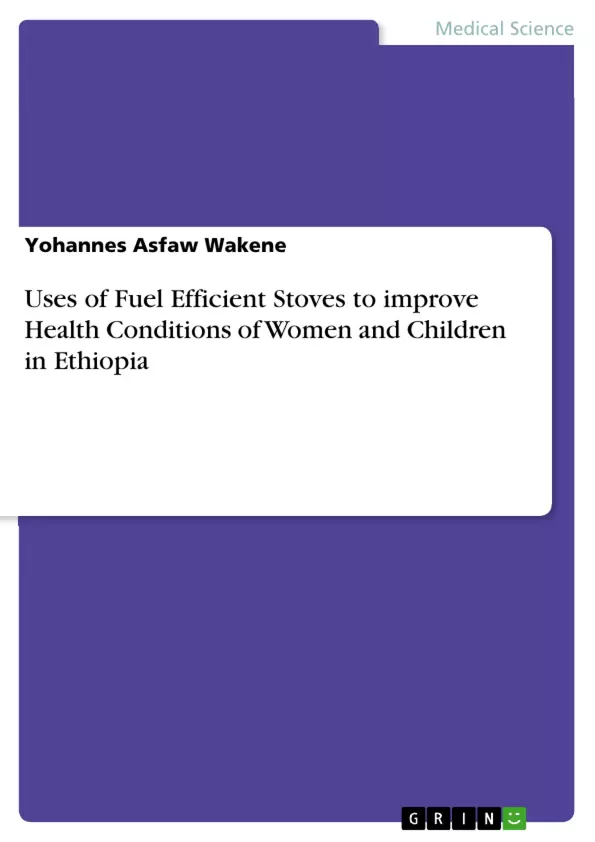This research report aimed at identifying the problem that women and girls/children encounter during collection of much biomass fire wood and face health risk at indoor activities when cooking. The research gives awareness for the community to use fuel saving stove that minimize fuel and reduce smoke that hazard their health.
Many house hold from the district town and rural people knows nothing about fuel saving stove/FSS/ and are not using it in their home. They use traditional three stone fire or open fire for cooking, heating and lighting their houses. In a traditional open fire, three stones are placed in a triangular pattern on the ground, with the cooking pots resting on the stones directly above the fire. The open flame and lack of chimney or combustion chamber make this cooking fire inherently energy-inefficient. Rural women/ girls are consuming their time, energy their efforts in gathering fire wood from forest which is far from their home. As a result of this they don’t have time for education, if they are student they don’t have time for studying since they are responsible for role of cooking food in the household. When we compare boys with girl in the same house, girls role in household is much more tedious than the boy. Women/girls are exposed to sexual assault, rape, and kidnaps when they are going to collect firewood in the forest by men. As a result of this they are morally, physically and Psychologically harmed and their well-being will be affected.
Inhaltsverzeichnis (Table of Contents)
- 1 INTRODUCTION
- 1.1 Background of the study
- 1.2 Statement of the problem
- 1.3 Research objective
- 1.4 Significance of the study
- 1.5 Scope and limitations the study
- 2. LITERATURE REVIEW
- 2.1. Theoretical review
- 2.1.1 Definition of Stove
- 2.1.2Types of cooking stove
- 2.2. Empirical review
- 3. RESEARCH METHODLOGY
- 3.1. Description of the Study Area
- 3.2. Research Design
- 3.3. Source and Method of Data Collection
- 3.4. Sampling Technique and Sampling Procedures
- 3.4.1. Sample Size
- 3.5. Method of Data Analysis
- 4. RESULT AND DISCUSSION-
Zielsetzung und Themenschwerpunkte (Objectives and Key Themes)
This research aims to investigate the role of fuel-saving stoves on the well-being of women and children in Lalo Assabi Woreda, Ethiopia. It explores the benefits of improved stoves in terms of energy efficiency, time and burden reduction in firewood collection, and the mitigation of exposure to physical harm and gender-based violence. The study aims to provide evidence for the positive impact of fuel-saving stoves on the lives of rural communities.
- The impact of fuel-saving stoves on women and children's well-being.
- The role of improved stoves in reducing the burden of firewood collection.
- The effectiveness of fuel-saving stoves in mitigating health risks associated with traditional cooking practices.
- The potential of improved stoves to promote gender equality and reduce exposure to violence.
- The contribution of fuel-saving stoves to sustainable development and environmental protection.
Zusammenfassung der Kapitel (Chapter Summaries)
- Chapter 1: Introduction - This chapter provides background information on the reliance of rural populations in Ethiopia and Sub-Saharan Africa on wood fuel for cooking and heating, highlighting the associated environmental and social challenges. It emphasizes the importance of clean energy solutions and the role of fuel-efficient stoves in improving the well-being of women and children.
- Chapter 2: Literature Review - This chapter presents a comprehensive review of existing literature related to the use of traditional cooking stoves and the benefits of improved stoves. It delves into theoretical concepts and empirical research findings, exploring the various types of cooking stoves and their impact on health, environment, and gender dynamics.
- Chapter 3: Research Methodology - This chapter describes the research design, study area, data collection methods, and sampling procedures used in the study. It outlines the approach to gathering data from both primary and secondary sources and explains the methods used to analyze the collected information.
Schlüsselwörter (Keywords)
The study focuses on the intersection of fuel-efficient stoves, women's and children's well-being, environmental sustainability, and gender equality in rural Ethiopia. Key terms include fuel-saving stoves, biomass fuels, traditional cooking practices, health impacts, gender-based violence, energy efficiency, and sustainable development.
Frequently Asked Questions
What are the primary health risks associated with traditional cooking in rural Ethiopia?
Traditional cooking using open fires or three-stone stoves causes significant indoor air pollution. Women and children are exposed to high levels of smoke, which leads to respiratory illnesses and other health hazards.
How does firewood collection impact the education of girls?
Collecting biomass firewood is a time-consuming and energy-draining task. Girls responsible for this chore often lack the time and energy required for schooling and studying, putting them at an educational disadvantage compared to boys.
What safety risks do women face when gathering firewood?
Women and girls often have to travel to distant forests to find wood, where they are vulnerable to physical harm, including sexual assault, kidnapping, and other forms of gender-based violence.
Why is the traditional "three-stone fire" considered inefficient?
The traditional three-stone fire lacks a combustion chamber or chimney. The open flame allows heat to escape easily, making it energy-inefficient and producing excessive amounts of health-damaging smoke.
What are the benefits of using Fuel Saving Stoves (FSS)?
Fuel-saving stoves minimize fuel consumption, reduce harmful smoke emissions, decrease the time spent gathering wood, and help mitigate the physical and psychological risks associated with traditional cooking practices.
Where was this research on fuel-efficient stoves conducted?
The study focused on rural communities and district towns within the Lalo Assabi Woreda in Ethiopia.
- Quote paper
- Yohannes Asfaw Wakene (Author), 2022, Uses of Fuel Efficient Stoves to improve Health Conditions of Women and Children in Ethiopia, Munich, GRIN Verlag, https://www.grin.com/document/1334519



